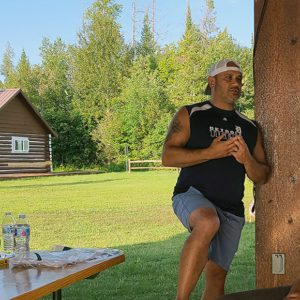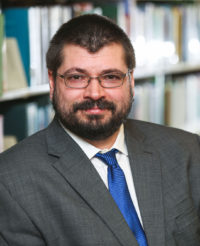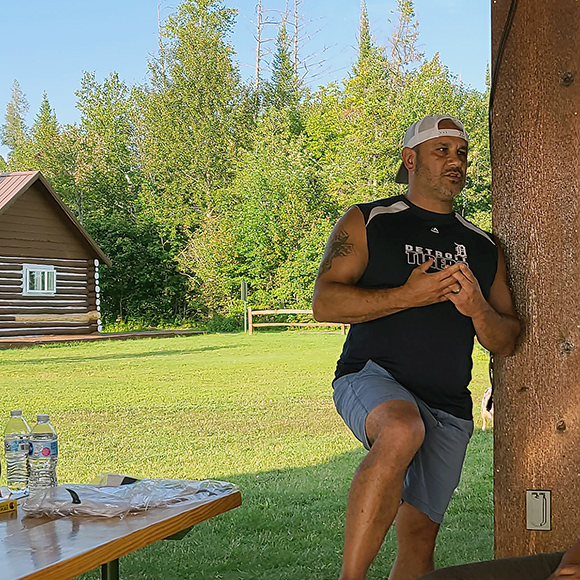Juvenile lifers Trauma Summer Camp: healing reimagined.
With the alarm ringing at 5 a.m. on a Sunday morning, I am thinking to myself, “I still have to pack and load my truck and pick up Walter by 6:15 so we can be in Ann Arbor by 7.” Walter is a friend from the inside who served 42 years, starting at the age of 17, and has been home three years.
We’re headed to the Youth Justice Fund’s Trauma Summer Camp today. The trauma retreat is set up to have various clinicians, counselors and artists to intersect on addiction, abuse and expression in very organic way. The retreat was held Up North near Petoskey — an area many of the participants have never spent time in, unless they were incarcerated in one of Michigan’s prisons in northern Michigan. We had a dozen or so people, including several juvenile lifers, that this retreat was set up for. And then you had others that served time in cages as well — like myself.
The days leading up to the trauma retreat, I was not sure what to expect. Both emotionally and spiritually, the last 18 months have been exceedingly difficult to say the least. Last February, I lost my oldest daughter to gun violence, and my life has not been the same since. Here at the retreat were men and women who served time for a crime that has rocked my family to the core. I approached it with an open mind and was comfortable giving myself space if necessary.
More than Our Worst Moments

Safe & Just Michigan Community Engagement Specialist Rick Speck leads a discussion at the Trauma Retreat. (Photo courtesy of Aaron Kinzel, Youth Justice Fund)
Yet it was the workshops about trauma — the lived experiences of these resilient men and women — that were the most rewarding and refreshing about the weekend. I learned so much, but to sum it up for me: Love has the power to change the world as we know it.
I have tried so hard to not let what happened to me and my family harden me to a community that I belong to. I was able to see that person who did this to me was not the same as the men and woman on the retreat that weekend. I was able to hear so much of the trauma that these beautiful human beings had endured as youth.
Like all of us, they are not the sum of their worst decision or deed. What I experienced was like watching the caterpillar transform into a butterfly. So many times, hurt people, hurt people. If we can begin to reduce the harm and trauma that occurs all across America, then we can begin to see our communities flourish instead of enduring loss and destruction and ultimately decay. Decay that is both seen and unseen. These men and women are a greater solution to the problems that hurt communities today. That begs the question of how to welcome home men and women to their communities that they were once a part of in a way that doesn’t cause further trauma to those communities or to the person coming home.
Hurting people hurt people; Healing people heal people
We need these men and women to share their stories so that we as a community can learn from them. and work to reduce harms that affect us all. I can honestly say I am a better person for attending and participating in the trauma retreat. It was so amazing to see how these three days in Northern Michigan could be transformative for these men and women. I saw smiles that extended all the way to their eyes, in so many ways. I felt humbled, inspired and healed; it was cathartic.
Although I served three terms spanning 18.5 years the — last one the bulk of it at 15 years — I can’t imagine the feelings of these men and women who were incarcerated at the ages of 15, 16 and 17 and served 30-plus years.
I do know from a conversation with Walt this was a life-changing experience for him. It helped him see a part of himself as a kid again, and that to me is priceless. Healing trauma helps rebuild lives and build safer communities for everyone — and that is what the work of Safe & Just Michigan is all about.
Rick Speck
Community Engagement Specialist
Aaron Kinzel on the Trauma Summer Camp

Aaron Kinzel
The 2020 Trauma Summer Camp was hosted by the Youth Justice Fund (YJF) under the leadership of me, Executive Director Aaron Kinzel, and my staff. It was an incredible and life changing event. Participants of this camp were all incarcerated at the age of 18 or less and experienced high levels of trauma in prison and in their communities before incarceration. The camp was full of clinical professionals who helped us navigate the demons of our past and they participated in various activities that built strong bonds amongst this group of individuals. Some slept in cabins and went swimming for the first time in their lives, and we all rode jet skis after trauma sessions to unleash the sadness in our hearts while simultaneously conquering our fear and pushing ourselves to new limits.
My biggest take away from the camp was a deep appreciation and empathy for my peers who all experienced incarceration as youth. I cried numerous times during this event and felt safe to express emotions in public that were held deep inside my soul. I was reminded of my own dark experiences in solitary confinement as a 15-year-old powerless child being subjected to the will of the carceral state and being chained like a rabid animal. Other men and women opened up with me, and I truly believe we all resolved some internal trauma and realized the interconnection between our life histories and re-entry into our communities. Hearing the stories of suffering was difficult, but to connect with these men and women and realize their resiliency was a beautiful thing, to say the least.
YJF is a small nonprofit committed to offering more trauma-informed programs. To support the Youth Justice Fund, please visit https://charity.gofundme.com/o/en/campaign/youth-justice-fund-covid-19-crisis.

